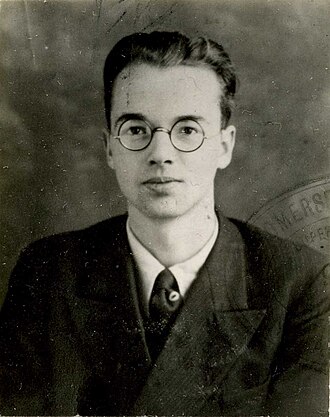Discover Your Roots
SIGN UPDiscover Your Roots
SIGN UPKlaus is a male name of German origin meaning "Victory Of The People." It is a German, Dutch, and Scandinavian given name and surname, derived from the German form of the Greek name Nicholas. Notable individuals with the given name Klaus include Klaus Badelt, a German composer, and Klaus Kinski, a renowned German actor. The name also has various fictional representations, such as Klaus Baudelaire from "A Series of Unfortunate Events" and Klaus Mikaelson from "The Vampire Diaries" and "The Originals." In addition, there are characters named Klaus in several video games and other media. The name Klaus is also associated with historical figures, such as Karl Ernst Claus, a notable Russian chemist. Furthermore, it is worth noting that Klaus is a variant of the name Claus and is linked to the Finnish village Klaukkala and other related variants like Klavs.

Klaus Martin Schwab, born on March 30, 1938, is a German mechanical engineer, economist, and the founder of the World Economic Forum (WEF). He served as the WEF's chairman from its inception in 1971 until 2025, when he transitioned to the role of chairman of the Board of Trustees. Schwab has an extensive academic background, holding a doctorate in engineering and economics, as well as a Master in Public Administration degree from Harvard University. He has been a professor of business policy at the University of Geneva and, along with his wife, established the Schwab Foundation for Social Entrepreneurship in 1998. In 1971, Schwab founded the European Management Forum, later renamed the World Economic Forum, and has authored several books, including "The Fourth Industrial Revolution." However, Schwab has faced criticism regarding his salary level, financial transparency, and the mixing of finances between the WEF and for-profit business ventures. Despite this, his influence on global economic and social agendas through the WEF remains significant.

Klaus Emil Julius Fuchs (29 December 1911 – 28 January 1988) was a German theoretical physicist and atomic spy who played a significant role during and shortly after World War II. He provided crucial information from the American, British, and Canadian Manhattan Project to the Soviet Union. Fuchs made significant theoretical calculations related to the first nuclear weapons and later worked on early models of the hydrogen bomb at the Los Alamos Laboratory. Born in Rüsselsheim, Germany, to a Lutheran pastor and his wife, Fuchs became involved in student politics during his time at the University of Leipzig and later the University of Kiel. After fleeing to the United Kingdom to escape Nazi persecution, he continued his academic pursuits and eventually passed information on the British atomic bomb project to the Soviet Union. After his conviction in 1950, Fuchs served nine years in a UK prison before migrating to East Germany, where he resumed his career as a physicist and scientific leader. Despite his controversial past, Fuchs made significant contributions to nuclear physics and was elected to the Academy of Sciences in East Germany.

Klaus Meine, born on 25 May 1948, is a renowned German singer and the longstanding frontman of the hard rock band Scorpions. Alongside guitarist Rudolf Schenker, Meine has been an integral part of every Scorpions album since joining the band in 1969. His lyrical prowess has been a defining element of the band's music, with notable contributions to hits like "Rock You Like a Hurricane" and "Wind of Change". Despite a vocal cord ailment in the early 1980s that threatened his career, Meine made a remarkable recovery and went on to receive numerous accolades, including the Cross of Merit First Class of the Lower Saxony Order of Merit and a Klaus Meine signature guitar. Beyond his work with Scorpions, Meine has collaborated with esteemed artists, showcasing his versatility and enduring influence in the music industry. His impact on the hard rock genre has been recognized with his placement on Hit Parader's 'Top Heavy Metal Vocalists of All Time' list in 2006, solidifying his status as a legendary figure in rock music.

Klaus Sperber, professionally known as Klaus Nomi, was a German countertenor recognized for his extraordinary vocal range and unique stage presence. Born on January 24, 1944, in Immenstadt, Bavaria, Nomi's formative years were shaped by a love for classical music and a fascination with pop rock. After moving to New York City in 1972, he ventured into off-Broadway theater and even operated a pastry shop while pursuing his musical aspirations. Nomi's breakthrough came in 1978 during the "New Wave Vaudeville" event, where his performance captivated the audience and propelled him into the spotlight of the East Village art scene. His collaboration with songwriter Kristian Hoffman led to the formation of a band, and Nomi's distinct style and repertoire, which included covers of both classical opera and post-punk renditions of pop standards, garnered widespread attention. Nomi's influence extended beyond music, as he collaborated with various talented individuals from different creative spheres. Tragically, his life was cut short at the age of 39 in 1983, but his legacy as an avant-garde performer and musical innovator endures to this day.

Klaus "Auge" Augenthaler, born on September 26, 1957, is a renowned German former professional football player and manager. He achieved significant success during his 15-year club career with Bayern Munich, winning seven Bundesliga titles. Augenthaler also made a mark in international football, representing the West Germany national team and securing victory in the FIFA World Cup in 1990. His contributions to Bayern Munich led to his recognition as a member of the club's greatest XI in history.Augenthaler's career highlights include captaining Bayern Munich, where he showcased his prowess as a defender and sweeper. He played a pivotal role in the team's victories and was known for his exceptional defensive abilities. His international career saw him make 27 appearances for West Germany, contributing to their World Cup triumph in 1990.Following his illustrious playing career, Augenthaler transitioned into coaching, managing various clubs including Grazer AK, 1. FC Nürnberg, Bayer 04 Leverkusen, and VfL Wolfsburg. His coaching stint showcased his leadership and strategic acumen, guiding teams to notable achievements.Throughout his career, Augenthaler has earned a multitude of honors and accolades, solidifying his legacy as a football icon. His enduring impact on the sport remains an integral part of football history.
All images displayed on this page are sourced from Wikipedia or Wikimedia Commons.We use these images under their respective Creative Commons or public domain licenses. Wherever applicable, author attributions and license information are provided. If you believe an image is used incorrectly or outside its license terms, please contact us so that we can review and correct the issue.